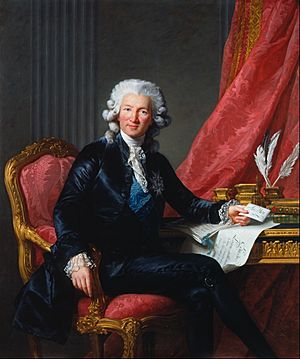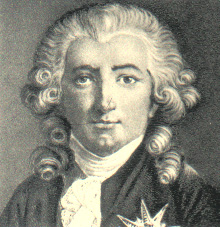Charles Alexandre de Calonne facts for kids
Quick facts for kids
Charles Alexandre de Calonne
Count of Hannonville
|
|
|---|---|

Portrait of Calonne by Élisabeth-Louise Vigée-Le Brun (1784, Royal Collection)
|
|
| Controller-General of Finances | |
| In office 3 November 1783 – 17 May 1787 |
|
| Monarch | Louis XVI |
| Preceded by | Henri Lefèvre d'Ormesson |
| Succeeded by | Michel Bouvard de Fourqueux |
| Personal details | |
| Born | 20 January 1734 Douai, French Flanders and Hainaut, France |
| Died | 30 October 1802 (aged 68) Paris, Seine, France |
| Spouses |
Marie Joséphine Marquet
(m. 1766; died 1770)Anne-Rose de Nettine
(m. 1788–1802) |
| Children | 1 son |
| Alma mater | University of Paris |
| Profession | Statesman, parliamentarian |
| Signature |  |
Charles Alexandre de Calonne (born January 20, 1734 – died October 30, 1802) was an important French politician. He was also known as the Count of Hannonville. Calonne is most remembered for his role just before the French Revolution.
He tried to fix France's money problems. He wanted to create new taxes that everyone would have to pay. But the powerful Parlement de Paris, a high court, would not agree. So, Calonne called a special meeting of important people, called the Assembly of Notables, in 1787. He hoped they would approve his ideas. When they said no, Calonne lost his job and had to leave France.
Contents
Early Life and Career
Charles Alexandre de Calonne was born in Douai, France. His family was from the upper class. He became a lawyer and worked in different government jobs. These jobs included being a "Master of Requests" and an "intendant" in cities like Metz and Lille. People saw him as a smart businessman. However, some thought he was not always honest in his political actions.
In 1783, France was facing a huge money crisis. The royal treasury was almost empty. Calonne was then chosen to be the Controller-General of Finances. This meant he was in charge of the country's money. He got this job with the help of the Comte de Vergennes, another powerful figure.
Calonne's Financial Plan
When Calonne took office, he found that France was deeply in debt. Much of this debt came from France helping in the American Revolution. He first tried to get more loans to keep the government running. He also reissued gold coins to help the economy.
Calonne soon realized that these short-term solutions were not enough. He came up with a big plan to fix France's finances for good. He presented this plan to King Louis XVI in 1786. The main idea was a new land value tax. This tax would replace older taxes and make everyone pay, even the rich nobles and clergy who usually did not pay much.
His plan also included other changes to make the French economy better. He wanted to allow free trade in grain. He also aimed to remove many internal customs barriers. These were like small taxes on goods moving between different parts of France. Calonne's plan was one of the biggest attempts to modernize France's economy during King Louis XVI's rule.

Proposed Reforms
Calonne's reform plan had five main points:
- Cut down on government spending.
- Bring back free trade methods.
- Allow the sale of Church property.
- Make salt and tobacco taxes equal for everyone.
- Start a universal land value tax on all property.
These ideas were very bold. However, the king did not have enough power to make them happen. Calonne knew that the Parlement of Paris would likely reject his tax ideas. So, he asked King Louis XVI to call a special meeting. This meeting was the Assembly of Notables, which met in February 1787.
Calonne explained to the Assembly how bad France's money problems were. He proposed his new tax, which would apply to all property owners. This meant that nobles and clergy would also have to pay.
Conflict with the Assembly
The idea of taxing everyone, including the privileged classes, was not popular. Calonne himself had a reputation for spending a lot of money. The Assembly of Notables was made up of important people from the old system. They did not like the idea of losing their special tax breaks.
They also suspected that Calonne was partly to blame for the huge debts. People in Paris protested against Calonne. They even burned effigies (dolls) of him in the streets. This showed how much they disliked his plans to raise taxes.
Because of this strong opposition, King Louis XVI fired Calonne on April 8, 1787. Calonne was then sent away to Lorraine. People in Paris were very happy about his dismissal. They called him "Monsieur Déficit" (Mr. Deficit) because they blamed him for the country's money problems.
Life in Exile and Return
After being fired, Calonne left France and went to Great Britain. He continued to argue with other French politicians, like Jacques Necker, through letters. Calonne felt that the king had abandoned him. He said, "The King, who assured me a hundred times that he would support me... abandoned me."
In 1789, when the Estates-General was about to meet, Calonne tried to return to France. But he was not allowed back into the country. In response, he joined a group of French nobles who had left France, called the émigrés. He spent most of his wife's money supporting this group.
He was present at Pillnitz in 1791 with the Count of Artois, the king's brother. They tried to threaten the new revolutionary government of France. Years later, in 1802, Napoleon Bonaparte gave Calonne permission to return to France. Calonne died about a month after coming back to his home country.
Calonne's Impact
Historians have different views on Calonne's role. Some, like Munro Price, believe that his bad reputation was unfair. They argue that he genuinely tried to fix France's money problems. A writer at the time, Nicolas Chamfort, said that Calonne was "applauded when he lit the fire, and condemned when he sounded the alarm." This means people liked his spending at first, but then blamed him when he pointed out the problems.
Calonne's failure to fix the finances showed how unstable the French monarchy was. For a long time, the king had controlled money matters in secret. When the huge debt became public, it made the monarchy look weak and corrupt. King Louis XVI had strongly supported Calonne's plans. When the Assembly of Notables and the parliament rejected them, the king saw it as a personal failure. This opposition deeply affected the king, and some historians believe it led to periods of depression for him.
Images for kids
See also
 In Spanish: Charles Alexandre de Calonne para niños
In Spanish: Charles Alexandre de Calonne para niños
 | Victor J. Glover |
 | Yvonne Cagle |
 | Jeanette Epps |
 | Bernard A. Harris Jr. |


